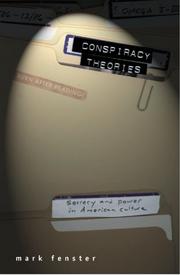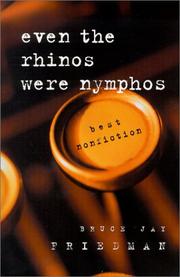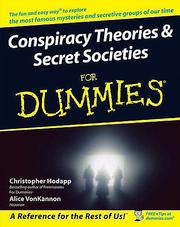| Listing 1 - 10 of 29 | << page >> |
Sort by
|

ISBN: 0226289753 9780226289755 0226289737 9780226289731 0226289745 9780226289748 Year: 2017 Publisher: Chicago
Abstract | Keywords | Export | Availability | Bookmark
 Loading...
Loading...Choose an application
- Reference Manager
- EndNote
- RefWorks (Direct export to RefWorks)
The Sleep of Reason plunges us into a macabre world where good impulses bring on evil consequences-a world not unlike our own. In David Gewanter's alternately delightful and startling poems, allegory comes alive and stalks a bookstore's musty aisles, comedians eviscerate their families for a laugh, lovers love each other for withholding affection, and theaters collapse on audiences hungry for spectacle. Amidst such surreal subjects, Gewanter's delicate musicality and keen sense of humor sparkle; his inquisition regarding a fallen world becomes a dark comedy of errors haunted by the most unexpected characters-from JFK Jr. to Tacitus, Redd Foxx to General Motors, Mariah Carey to 100 rabbits with herpes. An offbeat satire for an off-kilter age, The Sleep of Reason offers an incisive guide to moral behavior in an immoral world.
Book
ISBN: 9781405146036 9781405146029 Year: 2008 Volume: 3 Publisher: Malden, Mass. Blackwell
Abstract | Keywords | Export | Availability | Bookmark
 Loading...
Loading...Choose an application
- Reference Manager
- EndNote
- RefWorks (Direct export to RefWorks)
Gladiator (Film) --- Gladiator (Motion picture) --- Il faut sauver le soldat Ryan (Film) --- JFK (Film) --- JFK (Motion picture) --- La liste de Schindler (Film) --- Saving Private Ryan (Film) --- Saving Private Ryan (Motion picture) --- Schindler's List (Film) --- Schindler's List (Motion picture) --- Spartacus (Film) --- Spartacus (Motion picture) --- United 93 (Film) --- United 93 (Motion picture) --- World Trade Center (Film) --- World Trade Center (Motion picture) --- #SBIB:309H1326 --- Films met een amusementsfunctie en/of esthetische functie: genres en richtingen --- Historical films --- History and criticism. --- Film --- United States --- History and criticism --- United States of America

ISBN: 081663243X Year: 1999 Publisher: Minneapolis, MN : University of Minnesota Press,
Abstract | Keywords | Export | Availability | Bookmark
 Loading...
Loading...Choose an application
- Reference Manager
- EndNote
- RefWorks (Direct export to RefWorks)
Conspiracy theories --- CONSPIRATION --- ETATS-UNIS --- conspiracies --- United States --- ideology --- politics --- counterintelligences --- conspiracy theories --- conspiracy belief --- conspiracism --- secrecy and power in American culture --- conspiracy theory and populism --- Richard Hofstadter (1916-1970) --- John F. Kennedy (1917-1963) --- millennialism --- christian conspiracy theory --- conspiracy narrative --- Bill Clinton --- Clinton Chronicles --- film and literature --- JFK (film) --- X-files (film) --- conspiracy community --- Danny Casolaro (1947-1991) --- conspiracy games

ISBN: 022647576X 9780226475769 0226263509 9780226263502 Year: 2000 Publisher: Chicago
Abstract | Keywords | Export | Availability | Bookmark
 Loading...
Loading...Choose an application
- Reference Manager
- EndNote
- RefWorks (Direct export to RefWorks)
A few years ago, Christopher Buckley wrote of Bruce Jay Friedman in the New York Times Book Review that he "has been likened to everyone from J. D. Salinger to Woody Allen," but that "he is: Bruce Jay Friedman, sui generis, and no mean thing. No further comparisons are necessary." We are happy to report that he remains the same Bruce Jay Friedman in his unique, unblinking, and slightly tilted essays-collected here for the first time-in Even the Rhinos Were Nymphos. A butler school in Houston, a livestock auction in Little Rock, a home for "frozen guys" in California, JFK's humidor in Manhattan-all are jumping off points for Friedman's baleful and sharply satirical scrutiny of American life and behavior in the second half of the twentieth century. Travel with Friedman from Harlem to Hollywood, from Port-au-Prince to Etta's Eat Shop in Chicago. In these pieces, which were published in literary and mass-circulation magazines from the 1960s to the 1990s, you'll meet such luminaries as Castro and Clinton, Natalie Wood and Clint Eastwood, and even Friedman's friends Irwin Shaw, Nelson Algren, and Mario Puzo. Friedman is a master of the essay, whether the subject is crime reporting ("Lessons of the Street"), Hollywood shenanigans ("My Life among the Stars"), or his outrageous adventures as the editor of pulp magazines (the classic "Even the Rhinos Were Nymphos"). We could sing his praises as a journalist, humorist, and social critic. But, as Buckley tells us, being Bruce Jay Friedman is enough. Bruce Jay Friedman is the author of seven novels (including The Dick, Stern, and A Mother's Kisses), four collections of short stories, four full-length plays (including Scuba Duba and Steambath), and the screenplays for the movies Splash and Stir Crazy.
Authors, American --- American authors --- castro, clinton, natalie wood, clint eastwood, irwin shaw, nelson algren, mario puzo, crime, journalism, hollywood, celebrity, fame, pulp magazines, editor, houston, little rock, california, jfk, manhattan, satire, social commentary, american culture, nonfiction, history, politics, harlem, race, port au prince, chicago, essays, literature, media, humor.
Book
ISBN: 022641826X 022621124X 9780226211244 9780226211107 Year: 2015 Publisher: Chicago London
Abstract | Keywords | Export | Availability | Bookmark
 Loading...
Loading...Choose an application
- Reference Manager
- EndNote
- RefWorks (Direct export to RefWorks)
When Thomas Jefferson struck a deal for the Louisiana Purchase in 1803, he knew he was adding a new national power to those specified in the Constitution, but he also believed his actions were in the nation's best interest. His successors would follow his example, setting their own constitutional precedents. Tracing the evolution and expansion of the president's formal power, Untrodden Ground reveals the president to be the nation's most important law interpreter and examines how our commanders-in-chief have shaped the law through their responses to important issues of their time. Reviewing the processes taken by all forty-four presidents to form new legal precedents and the constitutional conventions that have developed as a result, Harold H. Bruff shows that the president is both more and less powerful than many suppose. He explores how presidents have been guided by both their predecessors' and their own interpretations of constitutional text, as well as how they implement policies in ways that statutes do not clearly authorize or forbid. But while executive power has expanded far beyond its original conception, Bruff argues that the modern presidency is appropriately limited by the national political process-their actions are legitimized by the assent of Congress and the American people or rejected through debilitating public outcry, judicial invalidation, reactive legislation, or impeachment. Synthesizing over two hundred years of presidential activity and conflict, this timely book casts new light on executive behavior and the American constitutional system.
Executive power --- Implied powers (Constitutional law) --- Presidents --- History. --- History. --- History. --- constitution, american, united states of america, usa, president, presidents, history, historical, government, governing, politicians, leaders, leadership, law, legal, interpretations, national power, nation state, presidential powers, executive branch, george washington, thomas jefferson, abraham lincoln, roosevelt, richard nixon, jfk, bush, barack obama, interpretation, understanding, supreme, founding document, separation, federal, authority, responsibility.
Book
ISBN: 0674259963 0674259971 Year: 2021 Publisher: Cambridge, Massachusetts : Harvard University Press,
Abstract | Keywords | Export | Availability | Bookmark
 Loading...
Loading...Choose an application
- Reference Manager
- EndNote
- RefWorks (Direct export to RefWorks)
"When Sorrow Comes explores the sermons that American clergy, primarily Protestant ministers, gave in the first weeks after national crises, beginning with Pearl Harbor. Additional chapters include the sermons given after the assassinations of John F. Kennedy and Martin Luther King Jr.; those given after the Oklahoma City bombing and the LA "Race Riots"; a chapter on the sermons given in the immediate aftermath of September 11, 2001; and a final chapter on the killing of Trayvon Martin and the Newtown School Shooting. The book focuses on three broad analytic questions: How do the sermons understand the tragedy and recommend that listeners process their grief? What assumptions inform the clergy's narratives of the relation between church and state during the crisis? What are the meanings ascribed to being both a Christian and a citizen during each emergency?"--
Church and state --- Topical preaching --- Religion and civil society --- Crisis management --- History --- Religious aspects --- Christianity. --- American political identity. --- Antigone. --- JFK assassination. --- MLK assassination. --- Newtown School Shooting. --- Oklahoma Bombing. --- Pearl Harbor. --- Rodney King uprising. --- Sermons. --- Trayvon Martin. --- church/state. --- civil society. --- mourning. --- preaching. --- pulpit.

ISBN: 9780470184080 Year: 2008 Publisher: Hoboken, NJ Wiley Publishing, Inc.
Abstract | Keywords | Export | Availability | Bookmark
 Loading...
Loading...Choose an application
- Reference Manager
- EndNote
- RefWorks (Direct export to RefWorks)
conspiracy theories --- secret societies --- JFK --- apocalypse --- mafia --- banks and super-committees --- conspiracy theory --- conspiracies --- John F. Kennedy (1917-1963) --- conspiracism --- conspiracy belief --- secret societies in ancient times --- freemasonry --- freemasons --- rosicrucianism --- rosicrucians --- 9-11 --- 11 September 2001 --- illuminati --- racial conspiracies --- religious conspiracies --- apocalyptic conspiracies --- presidential assassinations --- hate groups --- real conspiracies
Book
ISBN: 9782357840324 Year: 2017 Publisher: Agnières SARL JMG Editions
Abstract | Keywords | Export | Availability | Bookmark
 Loading...
Loading...Choose an application
- Reference Manager
- EndNote
- RefWorks (Direct export to RefWorks)
complots --- John F. Kennedy --- JFK --- Cuba --- mafia --- Vietnam --- soupçon --- fin de siècle --- 11 septembre 2001 --- terrorisme et intégrisme --- Ovnis --- secrets et faux complots --- complotisme --- médias --- manipulation --- CIA --- États-Unis --- World Trade Center (WTC) --- attentats --- assassinats --- théorie du complot --- théories du complot --- conjurationnisme --- conspirationnisme --- pensée conspirationniste --- désinformation --- Martin Luther King (1929-1968) --- Watergate --- UFO
Book
ISBN: 024373283X Year: 1964 Publisher: Washington, D.C. United States Government Printing Office
Abstract | Keywords | Export | Availability | Bookmark
 Loading...
Loading...Choose an application
- Reference Manager
- EndNote
- RefWorks (Direct export to RefWorks)
Whilst the greatest effort has been made to ensure the quality of this text, due to the historical nature of this content, in some rare cases there may be minor issues with legibility. Mr. Griffin. All right. In addition to the front cover, what I am going to do is number the pages at the bottom, and I will put my initials on each. I will make it clear that I am numbering only the separate sheets of paper. I am not numbering each side of the paper. We can refer to these pages as the numbered side and the reverse side for purposes of discussion.
Assassination. --- Kennedy, John F. --- Political murder --- Murder --- Political crimes and offenses --- Political violence --- Gannaidi, --- J. F. K. --- JFK --- Kan-nai-ti, --- Kanadī, Jūn Fītz Jīrāld, --- Kanīdī, Jūn F., --- Kʻenedi, --- Kenedi, Dzhon F., --- Kenedi, Džon Fricdžerald, --- Ḳenedi, G'on F., --- Kenedijs, Džons F., --- Kennedi, Dzhon Fit͡sdzherald, --- Kennedy, Jack, --- Kennedy, John Fitzgerald, --- Kennedy, Ken, --- Kindī, Jān If., --- Kinidī, Jān If., --- Kennedy, John Fitzgerald
Book
ISBN: 1283242249 9786613242242 0226326764 9780226326764 0226326780 9780226326788 9781283242240 9780226326771 0226326772 9780226326788 0226326780 Year: 2011 Publisher: Chicago
Abstract | Keywords | Export | Availability | Bookmark
 Loading...
Loading...Choose an application
- Reference Manager
- EndNote
- RefWorks (Direct export to RefWorks)
The rise of right-wing broadcasting during the Cold War has been mostly forgotten today. But in the 1950s and '60s you could turn on your radio any time of the day and listen to diatribes against communism, civil rights, the United Nations, fluoridation, federal income tax, Social Security, or JFK, as well as hosannas praising Barry Goldwater and Jesus Christ. Half a century before the rise of Rush Limbaugh and Glenn Beck, these broadcasters bucked the FCC's public interest mandate and created an alternate universe of right-wing political coverage, anticommunist sermons, and pro-business bluster. A lively look back at this formative era, What's Fair on the Air? charts the rise and fall of four of the most prominent right-wing broadcasters: H. L. Hunt, Dan Smoot, Carl McIntire, and Billy James Hargis. By the 1970s, all four had been hamstrung by the Internal Revenue Service, the FCC's Fairness Doctrine, and the rise of a more effective conservative movement. But before losing their battle for the airwaves, Heather Hendershot reveals, they purveyed ideological notions that would eventually triumph, creating a potent brew of religion, politics, and dedication to free-market economics that paved the way for the rise of Ronald Reagan, the Moral Majority, Fox News, and the Tea Party.
Right-wing extremists --- Radio in politics --- Mass media and propaganda --- Hunt, H. L. --- Hargis, Billy James, --- Smoot, Dan. --- McIntire, Carl, --- cold war, right wing, radio, news, broadcasting, public interest, communism, civil rights, united nations, fluoridation, political parties, income tax, social security, jfk, barry goldwater, jesus, religion, conservatism, hl hunt, dan smoot, republicans, carl mcintire, billy james hargis, fairness doctrine, fcc, irs, free market, ideology, talk show, hosts, mass media, propaganda, evangelism, extremism, business, reagan, moral majority, fox, tea party, nonfiction, journalism, politics, fundamentalism.
| Listing 1 - 10 of 29 | << page >> |
Sort by
|

 Search
Search Feedback
Feedback About UniCat
About UniCat  Help
Help News
News